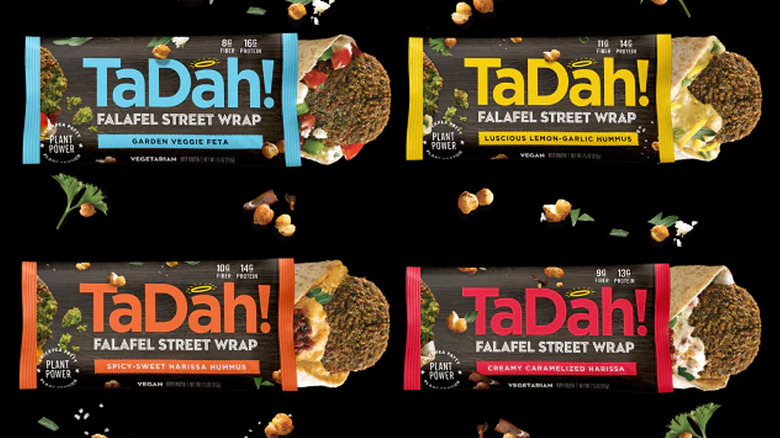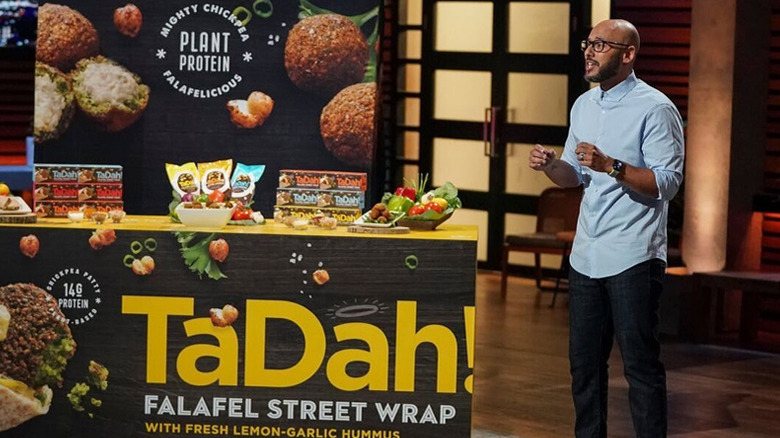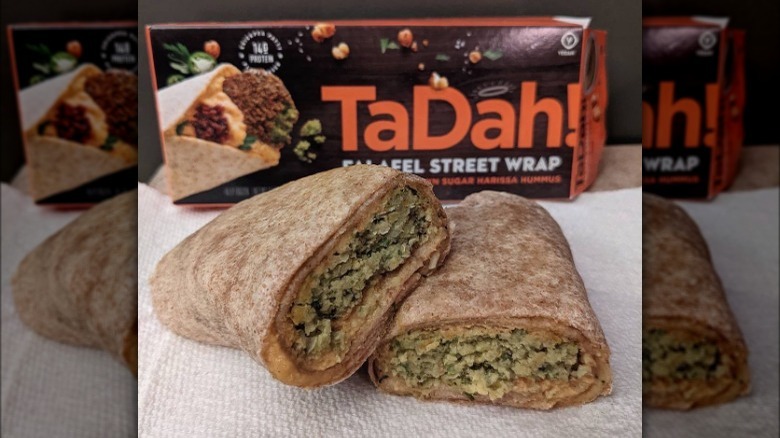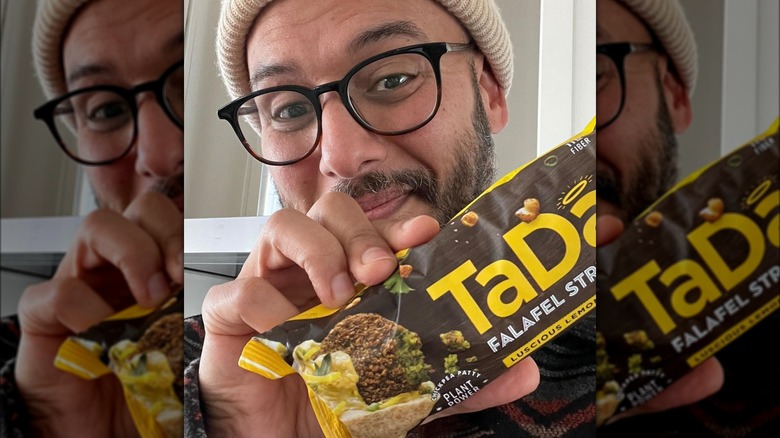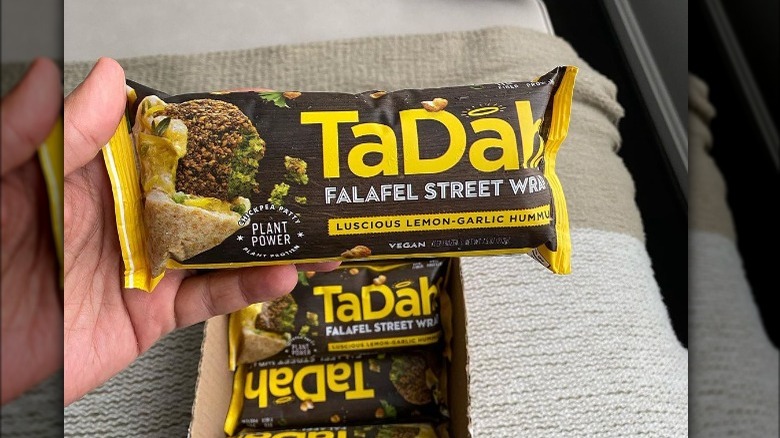TaDah: Here's What Happened After Shark Tank
The founder of TaDah, a frozen falafel wrap company, didn't begin his career slinging plant-based street food. As the son of immigrants who came to New York City from Egypt to escape religious persecution, John Sorial started with a chemical engineering degree from Johns Hopkins University. It was his lifelong love of the North African, Ethiopian, Lebanese, and Egyptian dishes that he grew up with, however — along with his family's involvement in the restaurant industry — that put him on the culinary path.
Sorial was inspired by food's ability to spread happiness, and he wanted to help people through tasty, nutritious food — and what better way to do that than with the international cuisine he'd been raised on: namely Middle Eastern falafel. Along with that, he aimed to create something that was convenient, a frozen entree that could be enjoyed in minutes, eventually leading to the creation of TaDah in 2010. Made with fresh chickpea falafel patties, award-winning spreads, and rolled in soft whole-wheat tortillas, the wraps come in four varieties: Lemon-garlic hummus, caramelized harissa, garden veggie feta, and spicy-sweet harissa.
The brand stands for more than just selling delicious food. It gives back 25% of its profits to organizations working for social change. Among them is the Meant 2 Live Foundation, which works with children in Zambia to break the cycle of poverty through food programs, medical care, and education. Sorial's dedication to this charity work is the driving force and mission behind everything his company represents.
What happened to TaDah on Shark Tank?
In 2019, John Sorial appeared on "Shark Tank" in Season 11, Episode 1 seeking an investment of $300,000 in exchange for 10% equity. He told the Sharks about his background while presenting TaDah samples. All enjoyed the food, especially guest judge Daniel Lubetzky (Kind Bar founder and CEO), who was impressed that, although the wraps had been frozen, they tasted fresh.
The wraps retailed for $3.99 and cost $1.09 to produce. Lifetime sales were $8.2 million, with $1 million from the previous 12 months. Profits remained flat because while the demand existed, the company was unable to meet it due to manufacturing issues that had since been resolved. Sorial revealed that $300,000 had been raised from family and friends, to which he had given up 75% ownership. This, along with the significant chunk of profits going to charity and lost to supply problems, was enough to make Lori Greiner, Robert Herjavec, and Kevin O'Leary tap out.
Sorial became emotional speaking about his motivations, which were to make an impact in the lives of those struggling. His passion resonated with Lubetzky, who made an offer of $300,000 for 20% equity, but also an alternate offer of half a million for 25%. Sorial asked for a line of credit in addition to the $500K, which Lubetzky declined. Mark Cuban made an offer of $300,000 for 20% but with a $500,000 credit line. After more attempts at negotiating, Sorial decided to accept Lubetzky's larger offer.
TaDah after Shark Tank
After "Shark Tank," John Sorial told CNBC that Daniel Lubetzky had been "extremely hands-on in the best possible way, and the momentum has been building by leaps and bounds." Just in time for the uptick in sales from appearing on "Shark Tank," the brand launched a new website with a store locator and online ordering. When the pandemic arrived in 2020, the company again faced supply chain troubles, but by the end of the year, TaDah was in many major retail locations, including Harris Teeter, Target, Publix, Whole Foods, Wegmans, Ralphs, Fred Meyer, Sprouts, and Walmart. In 2021, the falafel wraps became available at over 200 stores in the National Co+op Grocers network, as well as Costco stores in Los Angeles.
The brand's growth enabled it to make good on its goal of helping others by sponsoring over 200 orphaned school children in Zambia through the Meant 2 Live Foundation, providing breakfast and lunch during classes.
A crowdfunding campaign was announced in April 2021 with the company seeking $1 million to accelerate retail growth into 20,000 retail locations and double its product line, with a projected revenue of $25 million. The WeFunder campaign listed milestones for the brand such as surpassing $10 million in sales, and 2020's net sales topping 250% over 2019's. Notably, being on "Shark Tank" generated over 146 million online impressions across more than 40 media outlets. The investment round did not reach its target goal but did generate $771,391.
Is TaDah still in business?
Here's what we know: TaDah may no longer be in business, as its products are not being sold at the moment. Its official website is no longer available, and John Sorial noted his role as founder and managing partner for TaDah on his LinkedIn profile ending in January 2024.
Shortly before its website became unavailable, its online ordering system had been accepting orders, but shipping appeared limited. When we tried to place an order with shipping to New York, it allowed items to be placed in the cart, but trying to send a shipment to California produced an error message with shipping not available to that location. The website's store locator had also shut down, and according to customer complaints on the company's Instagram account, had been inoperative since at least June of 2023. On Facebook, visitors expressed frustration at not being able to locate the products in stores since as far back as April 2022. Product reviews and mentions seem to have died off around that same time as well.
However, it seems Sorial was planning a relaunch. In February 2024, the TaDah Foods Instagram account shared a picture of a cocoon and captioned it, "We know it has been awhile but we're working on coming back stronger and better than ever."
What's Next for TaDah?
The brand previously stated future plans to expand internationally as well as to extend its domestic reach, and this may still be in the works. John Sorial posted on LinkedIn in May 2023 that TaDah 3.0 was coming soon – though what this meant, or means, is unclear. That same month, Sorial created a GoFundMe campaign along with the organization Shepherd of Egypt to fund a trip he planned to travel to Egypt to help a group of people known as the "Penniless," who are mainly women and children living in extreme poverty and in unsafe conditions. The group provides for housing development, food, medical and hygiene supplies, as well as education. Within three days, the campaign reached its original goal of $10,000, which was then raised, closing at $15,200 in donations.
With such a high-quality product and initial run of successful expansions, we can only speculate as to what happened to cause the sudden halt in communication, availability, and progress for TaDah, but considering its founder's tenacity and admirable dedication to humanitarian causes, we hope we've not heard the last from TaDah just yet.

